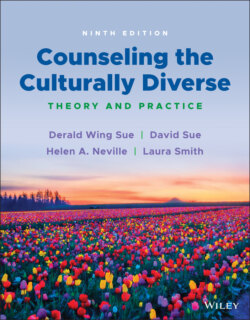Читать книгу Counseling the Culturally Diverse - Laura Smith L. - Страница 120
SUMMARY
ОглавлениеMicroaggressions represent daily stressors in the lives of marginalized groups in the United States. There is now ample research to support the idea that microaggressions are frustrating, psychologically taxing, and emotionally harmful to those who experience them.
Clients trust mental health professionals to take an intimate and deeply personal journey of self‐ exploration with them through the process of therapy. They grant these professionals the opportunity to look into their inner world and invite them to walk with them in their everyday lives. Therapists and counselors have an obligation to their clients, especially when their clients differ from them in terms of race, gender, ability, religion, or sexual orientation, to work to understand their experiential reality. Research suggests that when therapist and client are able to successfully discuss microaggressions, the therapeutic alliance can be restored. Therefore, therapists must be open to the idea that they can commit microaggressions against their clients and be willing to examine their role in this process.
Therapists and counselors are in a position to learn from their clients about microaggressions and their relationship to their presenting concerns and developmental issues. It is imperative to encourage clients to explore their feelings about incidents that involve their race, gender, and sexual orientation so that the status quo of silence and invisibility can be destroyed. Equally important is for counselors to familiarize themselves with the literature on microinterventions. One of the most promising avenues of proactive therapy for culturally diverse clients is to arm them with a repertoire of anti‐bias strategies, to provide them with a sense of control, and to enhance psychological well‐being.
Full Counseling Session Analysis video (Part II) for “Microaggressions in Counseling”
